Hospitality Business Toolkit Report: Level 4 Assignment
VerifiedAdded on 2021/02/21
|16
|5430
|29
Report
AI Summary
This report delves into the intricacies of the Hospitality Business Toolkit, focusing on Human Resource Management (HRM) within the hospitality sector. It begins with an introduction to ethical considerations in business, emphasizing the importance of ethical norms and moral values in fostering positive relationships between employers, employees, and clients. The report then explores the human resources life cycle, examining stages such as attracting talent, training, motivation, assessment, and employee retention. The report also presents a case study, analyzing the role of an Events Manager at Intercontinental Group (IHG), highlighting key responsibilities, required skills, and the significance of self-management in the position. It also discusses the importance of employee retention, strategies for motivating employees, and the impact of ethical considerations on each stage of the human resources life cycle. The report emphasizes the need for continuous training and development, the importance of employee satisfaction, and the role of HRM practices in fostering a competitive advantage for organizations. The report includes an in-depth analysis of HRM practices, employee motivation, performance assessment, and the overall impact of the HR life cycle on the organization's success. The report also discusses the importance of adapting to changing market conditions and technological advancements in the hospitality industry and concludes with a discussion on the relevance of knowledge, creativity, and innovation in the modern workplace.
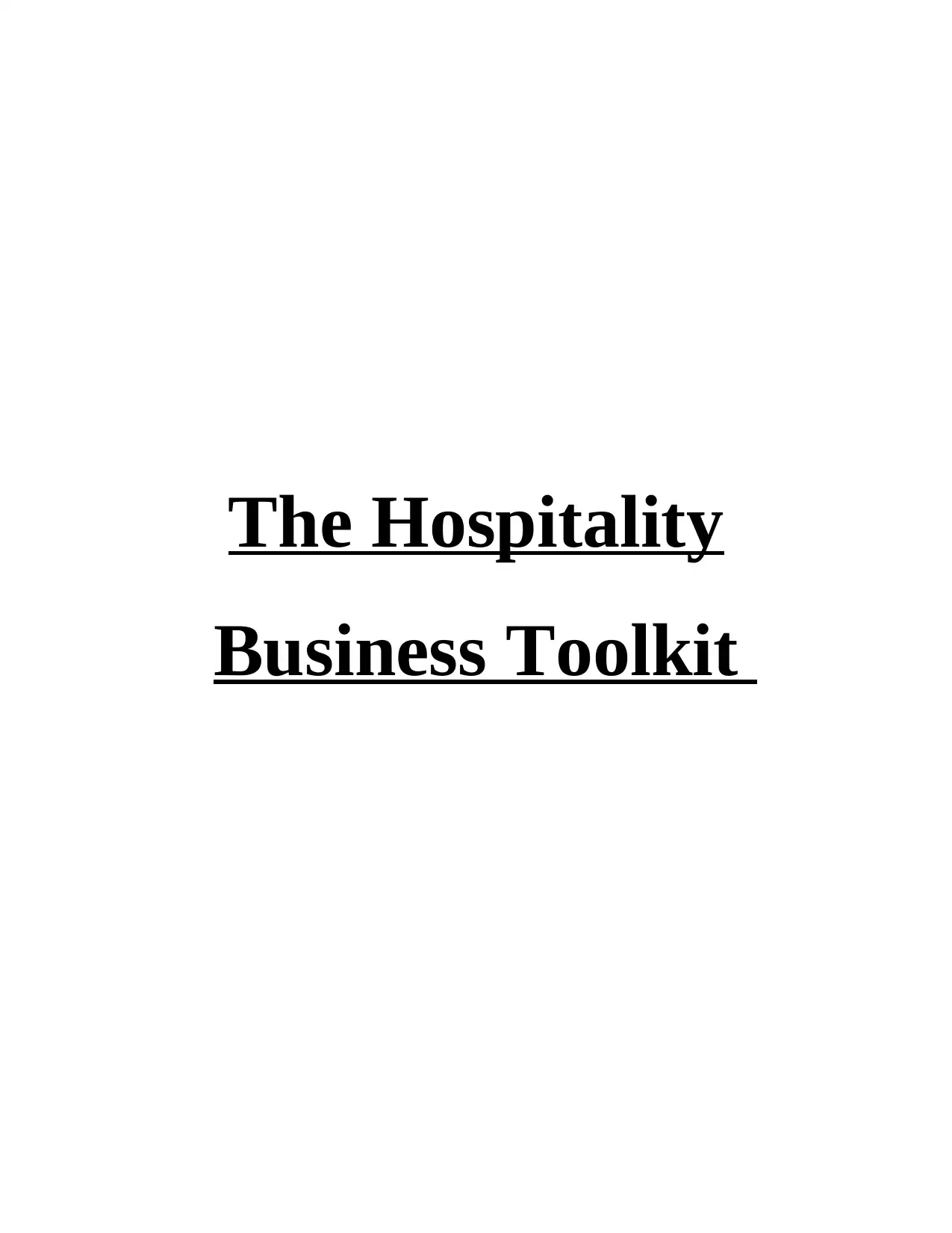
The Hospitality
Business Toolkit
Business Toolkit
Paraphrase This Document
Need a fresh take? Get an instant paraphrase of this document with our AI Paraphraser
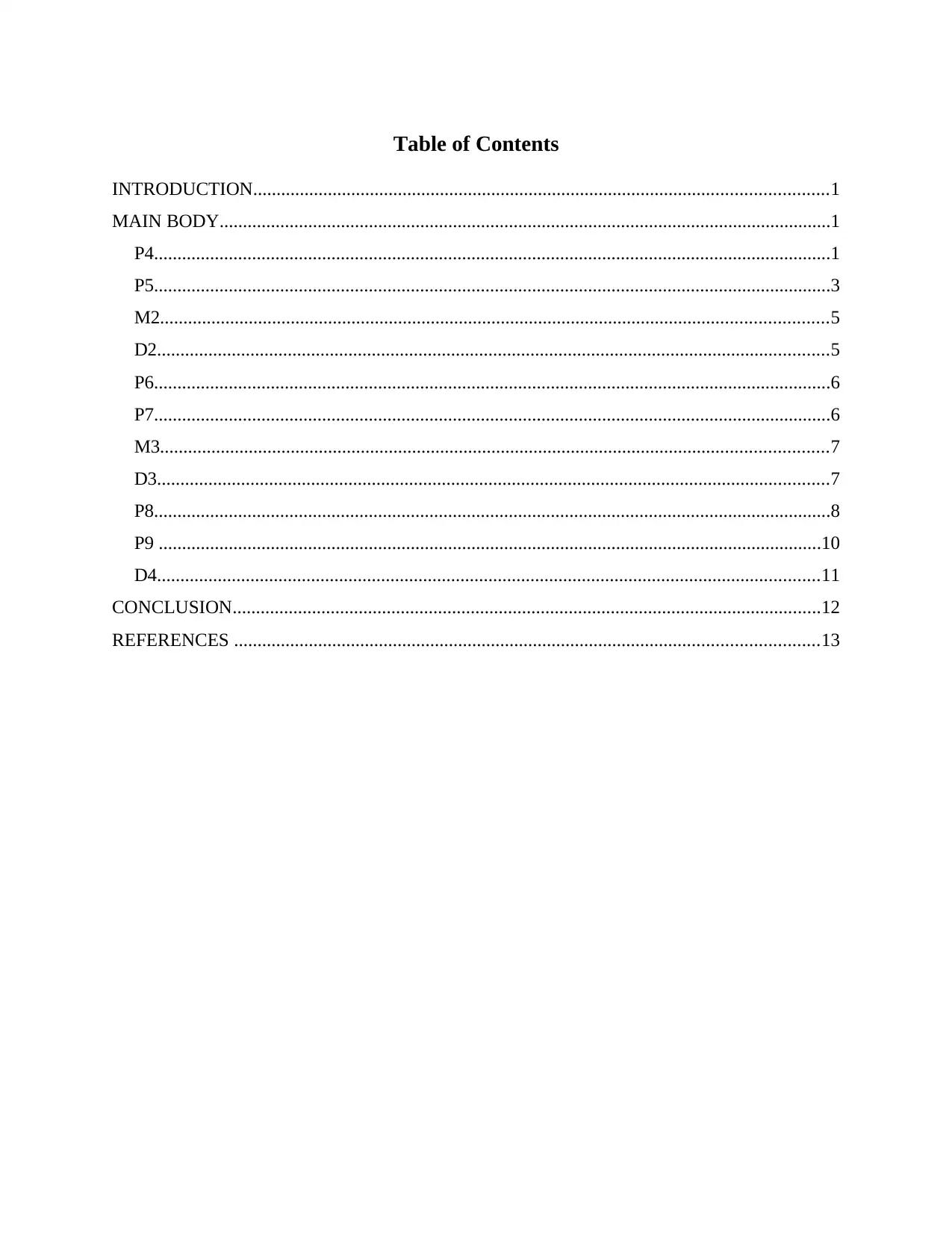
Table of Contents
INTRODUCTION...........................................................................................................................1
MAIN BODY...................................................................................................................................1
P4.................................................................................................................................................1
P5.................................................................................................................................................3
M2...............................................................................................................................................5
D2................................................................................................................................................5
P6.................................................................................................................................................6
P7.................................................................................................................................................6
M3...............................................................................................................................................7
D3................................................................................................................................................7
P8.................................................................................................................................................8
P9 ..............................................................................................................................................10
D4..............................................................................................................................................11
CONCLUSION..............................................................................................................................12
REFERENCES .............................................................................................................................13
INTRODUCTION...........................................................................................................................1
MAIN BODY...................................................................................................................................1
P4.................................................................................................................................................1
P5.................................................................................................................................................3
M2...............................................................................................................................................5
D2................................................................................................................................................5
P6.................................................................................................................................................6
P7.................................................................................................................................................6
M3...............................................................................................................................................7
D3................................................................................................................................................7
P8.................................................................................................................................................8
P9 ..............................................................................................................................................10
D4..............................................................................................................................................11
CONCLUSION..............................................................................................................................12
REFERENCES .............................................................................................................................13
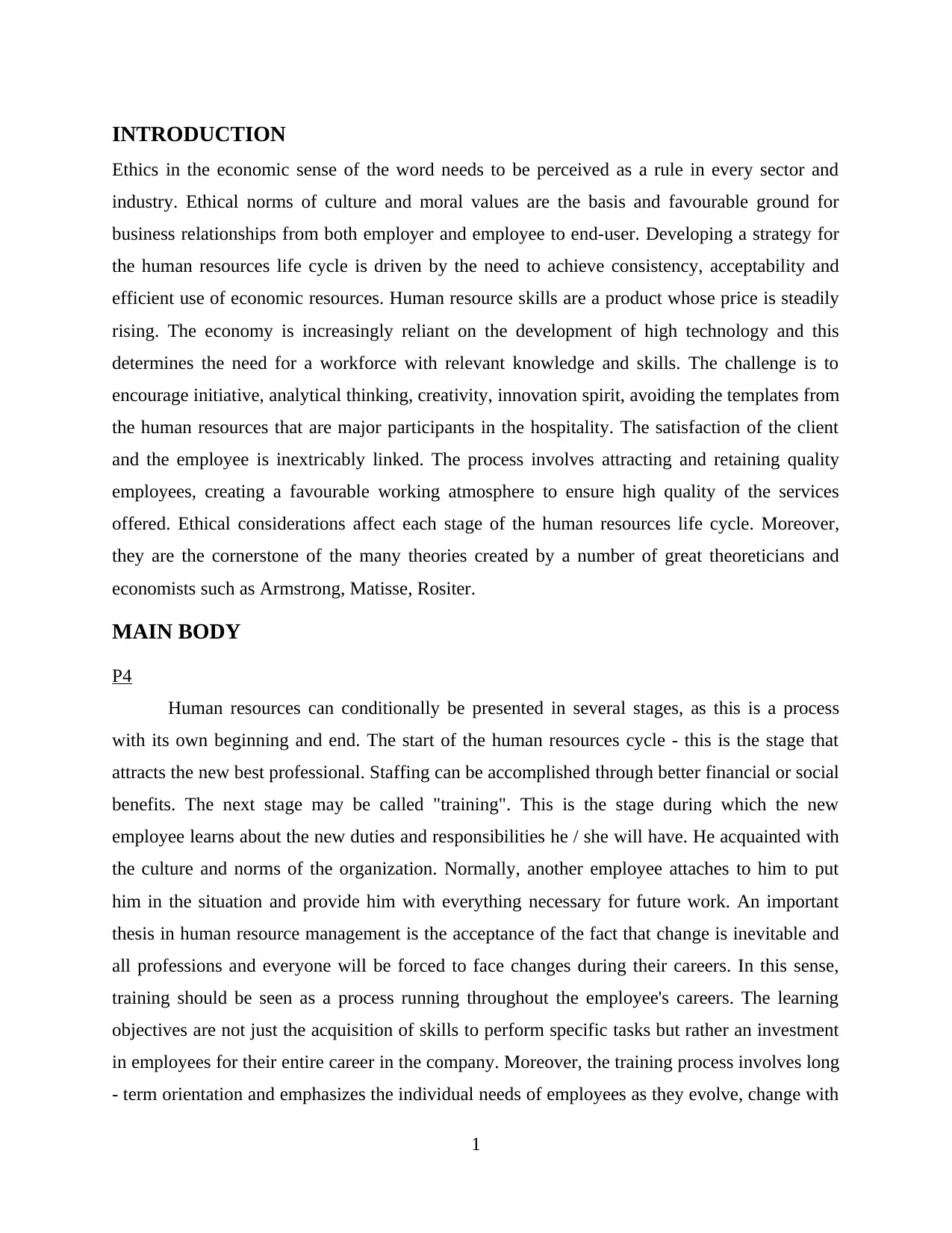
INTRODUCTION
Ethics in the economic sense of the word needs to be perceived as a rule in every sector and
industry. Ethical norms of culture and moral values are the basis and favourable ground for
business relationships from both employer and employee to end-user. Developing a strategy for
the human resources life cycle is driven by the need to achieve consistency, acceptability and
efficient use of economic resources. Human resource skills are a product whose price is steadily
rising. The economy is increasingly reliant on the development of high technology and this
determines the need for a workforce with relevant knowledge and skills. The challenge is to
encourage initiative, analytical thinking, creativity, innovation spirit, avoiding the templates from
the human resources that are major participants in the hospitality. The satisfaction of the client
and the employee is inextricably linked. The process involves attracting and retaining quality
employees, creating a favourable working atmosphere to ensure high quality of the services
offered. Ethical considerations affect each stage of the human resources life cycle. Moreover,
they are the cornerstone of the many theories created by a number of great theoreticians and
economists such as Armstrong, Matisse, Rositer.
MAIN BODY
P4
Human resources can conditionally be presented in several stages, as this is a process
with its own beginning and end. The start of the human resources cycle - this is the stage that
attracts the new best professional. Staffing can be accomplished through better financial or social
benefits. The next stage may be called "training". This is the stage during which the new
employee learns about the new duties and responsibilities he / she will have. He acquainted with
the culture and norms of the organization. Normally, another employee attaches to him to put
him in the situation and provide him with everything necessary for future work. An important
thesis in human resource management is the acceptance of the fact that change is inevitable and
all professions and everyone will be forced to face changes during their careers. In this sense,
training should be seen as a process running throughout the employee's careers. The learning
objectives are not just the acquisition of skills to perform specific tasks but rather an investment
in employees for their entire career in the company. Moreover, the training process involves long
- term orientation and emphasizes the individual needs of employees as they evolve, change with
1
Ethics in the economic sense of the word needs to be perceived as a rule in every sector and
industry. Ethical norms of culture and moral values are the basis and favourable ground for
business relationships from both employer and employee to end-user. Developing a strategy for
the human resources life cycle is driven by the need to achieve consistency, acceptability and
efficient use of economic resources. Human resource skills are a product whose price is steadily
rising. The economy is increasingly reliant on the development of high technology and this
determines the need for a workforce with relevant knowledge and skills. The challenge is to
encourage initiative, analytical thinking, creativity, innovation spirit, avoiding the templates from
the human resources that are major participants in the hospitality. The satisfaction of the client
and the employee is inextricably linked. The process involves attracting and retaining quality
employees, creating a favourable working atmosphere to ensure high quality of the services
offered. Ethical considerations affect each stage of the human resources life cycle. Moreover,
they are the cornerstone of the many theories created by a number of great theoreticians and
economists such as Armstrong, Matisse, Rositer.
MAIN BODY
P4
Human resources can conditionally be presented in several stages, as this is a process
with its own beginning and end. The start of the human resources cycle - this is the stage that
attracts the new best professional. Staffing can be accomplished through better financial or social
benefits. The next stage may be called "training". This is the stage during which the new
employee learns about the new duties and responsibilities he / she will have. He acquainted with
the culture and norms of the organization. Normally, another employee attaches to him to put
him in the situation and provide him with everything necessary for future work. An important
thesis in human resource management is the acceptance of the fact that change is inevitable and
all professions and everyone will be forced to face changes during their careers. In this sense,
training should be seen as a process running throughout the employee's careers. The learning
objectives are not just the acquisition of skills to perform specific tasks but rather an investment
in employees for their entire career in the company. Moreover, the training process involves long
- term orientation and emphasizes the individual needs of employees as they evolve, change with
1
⊘ This is a preview!⊘
Do you want full access?
Subscribe today to unlock all pages.

Trusted by 1+ million students worldwide
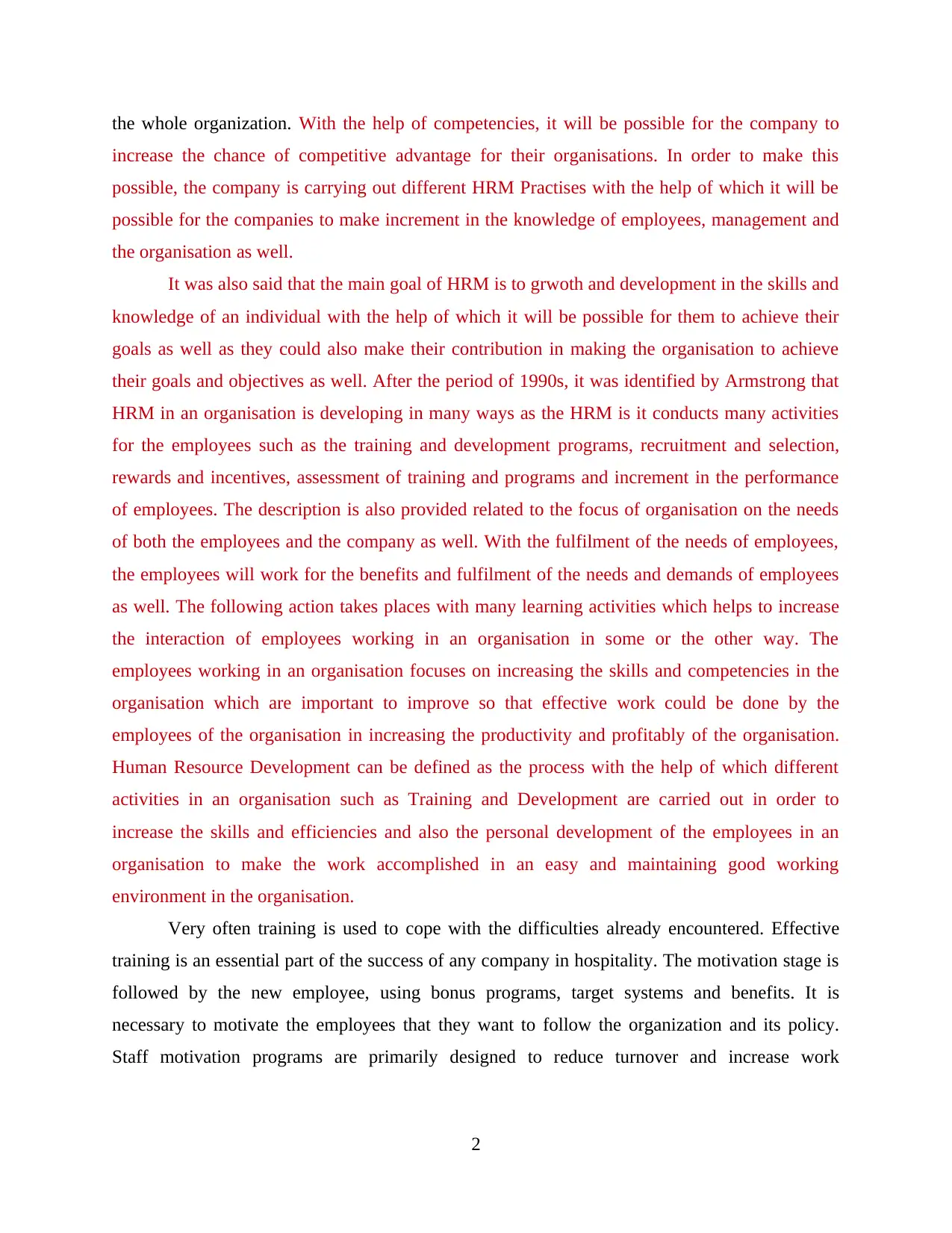
the whole organization. With the help of competencies, it will be possible for the company to
increase the chance of competitive advantage for their organisations. In order to make this
possible, the company is carrying out different HRM Practises with the help of which it will be
possible for the companies to make increment in the knowledge of employees, management and
the organisation as well.
It was also said that the main goal of HRM is to grwoth and development in the skills and
knowledge of an individual with the help of which it will be possible for them to achieve their
goals as well as they could also make their contribution in making the organisation to achieve
their goals and objectives as well. After the period of 1990s, it was identified by Armstrong that
HRM in an organisation is developing in many ways as the HRM is it conducts many activities
for the employees such as the training and development programs, recruitment and selection,
rewards and incentives, assessment of training and programs and increment in the performance
of employees. The description is also provided related to the focus of organisation on the needs
of both the employees and the company as well. With the fulfilment of the needs of employees,
the employees will work for the benefits and fulfilment of the needs and demands of employees
as well. The following action takes places with many learning activities which helps to increase
the interaction of employees working in an organisation in some or the other way. The
employees working in an organisation focuses on increasing the skills and competencies in the
organisation which are important to improve so that effective work could be done by the
employees of the organisation in increasing the productivity and profitably of the organisation.
Human Resource Development can be defined as the process with the help of which different
activities in an organisation such as Training and Development are carried out in order to
increase the skills and efficiencies and also the personal development of the employees in an
organisation to make the work accomplished in an easy and maintaining good working
environment in the organisation.
Very often training is used to cope with the difficulties already encountered. Effective
training is an essential part of the success of any company in hospitality. The motivation stage is
followed by the new employee, using bonus programs, target systems and benefits. It is
necessary to motivate the employees that they want to follow the organization and its policy.
Staff motivation programs are primarily designed to reduce turnover and increase work
2
increase the chance of competitive advantage for their organisations. In order to make this
possible, the company is carrying out different HRM Practises with the help of which it will be
possible for the companies to make increment in the knowledge of employees, management and
the organisation as well.
It was also said that the main goal of HRM is to grwoth and development in the skills and
knowledge of an individual with the help of which it will be possible for them to achieve their
goals as well as they could also make their contribution in making the organisation to achieve
their goals and objectives as well. After the period of 1990s, it was identified by Armstrong that
HRM in an organisation is developing in many ways as the HRM is it conducts many activities
for the employees such as the training and development programs, recruitment and selection,
rewards and incentives, assessment of training and programs and increment in the performance
of employees. The description is also provided related to the focus of organisation on the needs
of both the employees and the company as well. With the fulfilment of the needs of employees,
the employees will work for the benefits and fulfilment of the needs and demands of employees
as well. The following action takes places with many learning activities which helps to increase
the interaction of employees working in an organisation in some or the other way. The
employees working in an organisation focuses on increasing the skills and competencies in the
organisation which are important to improve so that effective work could be done by the
employees of the organisation in increasing the productivity and profitably of the organisation.
Human Resource Development can be defined as the process with the help of which different
activities in an organisation such as Training and Development are carried out in order to
increase the skills and efficiencies and also the personal development of the employees in an
organisation to make the work accomplished in an easy and maintaining good working
environment in the organisation.
Very often training is used to cope with the difficulties already encountered. Effective
training is an essential part of the success of any company in hospitality. The motivation stage is
followed by the new employee, using bonus programs, target systems and benefits. It is
necessary to motivate the employees that they want to follow the organization and its policy.
Staff motivation programs are primarily designed to reduce turnover and increase work
2
Paraphrase This Document
Need a fresh take? Get an instant paraphrase of this document with our AI Paraphraser
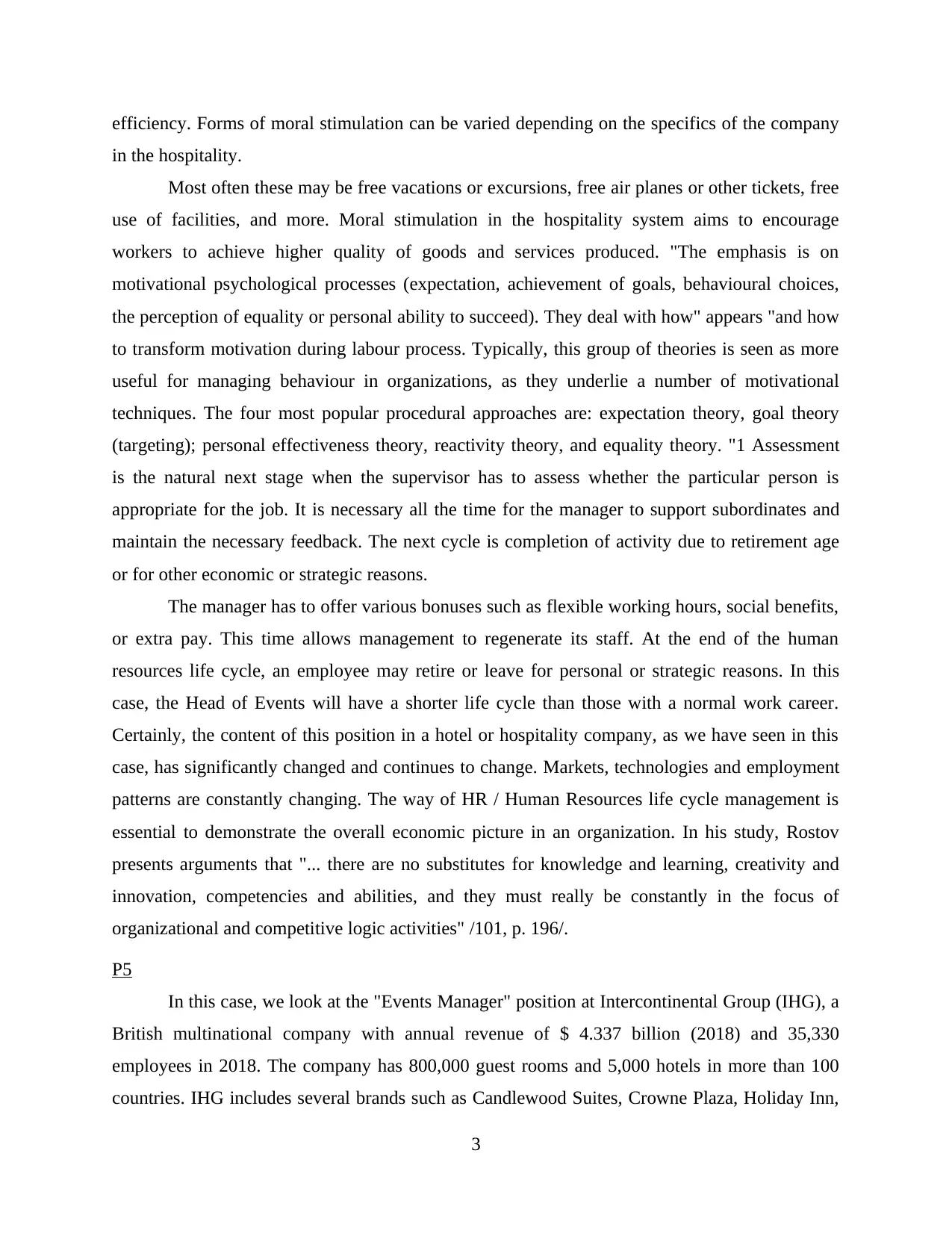
efficiency. Forms of moral stimulation can be varied depending on the specifics of the company
in the hospitality.
Most often these may be free vacations or excursions, free air planes or other tickets, free
use of facilities, and more. Moral stimulation in the hospitality system aims to encourage
workers to achieve higher quality of goods and services produced. "The emphasis is on
motivational psychological processes (expectation, achievement of goals, behavioural choices,
the perception of equality or personal ability to succeed). They deal with how" appears "and how
to transform motivation during labour process. Typically, this group of theories is seen as more
useful for managing behaviour in organizations, as they underlie a number of motivational
techniques. The four most popular procedural approaches are: expectation theory, goal theory
(targeting); personal effectiveness theory, reactivity theory, and equality theory. "1 Assessment
is the natural next stage when the supervisor has to assess whether the particular person is
appropriate for the job. It is necessary all the time for the manager to support subordinates and
maintain the necessary feedback. The next cycle is completion of activity due to retirement age
or for other economic or strategic reasons.
The manager has to offer various bonuses such as flexible working hours, social benefits,
or extra pay. This time allows management to regenerate its staff. At the end of the human
resources life cycle, an employee may retire or leave for personal or strategic reasons. In this
case, the Head of Events will have a shorter life cycle than those with a normal work career.
Certainly, the content of this position in a hotel or hospitality company, as we have seen in this
case, has significantly changed and continues to change. Markets, technologies and employment
patterns are constantly changing. The way of HR / Human Resources life cycle management is
essential to demonstrate the overall economic picture in an organization. In his study, Rostov
presents arguments that "... there are no substitutes for knowledge and learning, creativity and
innovation, competencies and abilities, and they must really be constantly in the focus of
organizational and competitive logic activities" /101, p. 196/.
P5
In this case, we look at the "Events Manager" position at Intercontinental Group (IHG), a
British multinational company with annual revenue of $ 4.337 billion (2018) and 35,330
employees in 2018. The company has 800,000 guest rooms and 5,000 hotels in more than 100
countries. IHG includes several brands such as Candlewood Suites, Crowne Plaza, Holiday Inn,
3
in the hospitality.
Most often these may be free vacations or excursions, free air planes or other tickets, free
use of facilities, and more. Moral stimulation in the hospitality system aims to encourage
workers to achieve higher quality of goods and services produced. "The emphasis is on
motivational psychological processes (expectation, achievement of goals, behavioural choices,
the perception of equality or personal ability to succeed). They deal with how" appears "and how
to transform motivation during labour process. Typically, this group of theories is seen as more
useful for managing behaviour in organizations, as they underlie a number of motivational
techniques. The four most popular procedural approaches are: expectation theory, goal theory
(targeting); personal effectiveness theory, reactivity theory, and equality theory. "1 Assessment
is the natural next stage when the supervisor has to assess whether the particular person is
appropriate for the job. It is necessary all the time for the manager to support subordinates and
maintain the necessary feedback. The next cycle is completion of activity due to retirement age
or for other economic or strategic reasons.
The manager has to offer various bonuses such as flexible working hours, social benefits,
or extra pay. This time allows management to regenerate its staff. At the end of the human
resources life cycle, an employee may retire or leave for personal or strategic reasons. In this
case, the Head of Events will have a shorter life cycle than those with a normal work career.
Certainly, the content of this position in a hotel or hospitality company, as we have seen in this
case, has significantly changed and continues to change. Markets, technologies and employment
patterns are constantly changing. The way of HR / Human Resources life cycle management is
essential to demonstrate the overall economic picture in an organization. In his study, Rostov
presents arguments that "... there are no substitutes for knowledge and learning, creativity and
innovation, competencies and abilities, and they must really be constantly in the focus of
organizational and competitive logic activities" /101, p. 196/.
P5
In this case, we look at the "Events Manager" position at Intercontinental Group (IHG), a
British multinational company with annual revenue of $ 4.337 billion (2018) and 35,330
employees in 2018. The company has 800,000 guest rooms and 5,000 hotels in more than 100
countries. IHG includes several brands such as Candlewood Suites, Crowne Plaza, Holiday Inn,
3
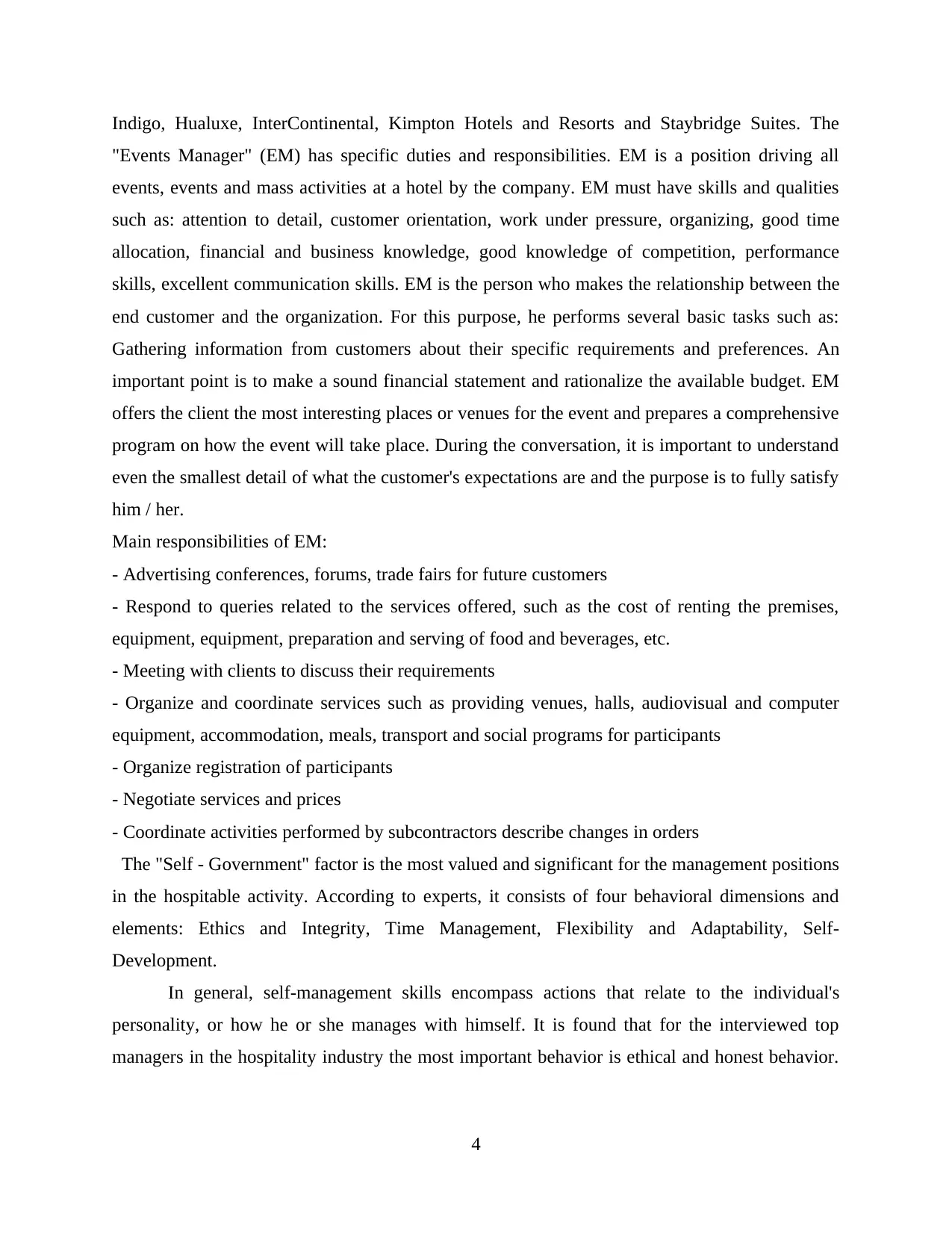
Indigo, Hualuxe, InterContinental, Kimpton Hotels and Resorts and Staybridge Suites. The
"Events Manager" (EM) has specific duties and responsibilities. EM is a position driving all
events, events and mass activities at a hotel by the company. EM must have skills and qualities
such as: attention to detail, customer orientation, work under pressure, organizing, good time
allocation, financial and business knowledge, good knowledge of competition, performance
skills, excellent communication skills. EM is the person who makes the relationship between the
end customer and the organization. For this purpose, he performs several basic tasks such as:
Gathering information from customers about their specific requirements and preferences. An
important point is to make a sound financial statement and rationalize the available budget. EM
offers the client the most interesting places or venues for the event and prepares a comprehensive
program on how the event will take place. During the conversation, it is important to understand
even the smallest detail of what the customer's expectations are and the purpose is to fully satisfy
him / her.
Main responsibilities of EM:
- Advertising conferences, forums, trade fairs for future customers
- Respond to queries related to the services offered, such as the cost of renting the premises,
equipment, equipment, preparation and serving of food and beverages, etc.
- Meeting with clients to discuss their requirements
- Organize and coordinate services such as providing venues, halls, audiovisual and computer
equipment, accommodation, meals, transport and social programs for participants
- Organize registration of participants
- Negotiate services and prices
- Coordinate activities performed by subcontractors describe changes in orders
The "Self - Government" factor is the most valued and significant for the management positions
in the hospitable activity. According to experts, it consists of four behavioral dimensions and
elements: Ethics and Integrity, Time Management, Flexibility and Adaptability, Self-
Development.
In general, self-management skills encompass actions that relate to the individual's
personality, or how he or she manages with himself. It is found that for the interviewed top
managers in the hospitality industry the most important behavior is ethical and honest behavior.
4
"Events Manager" (EM) has specific duties and responsibilities. EM is a position driving all
events, events and mass activities at a hotel by the company. EM must have skills and qualities
such as: attention to detail, customer orientation, work under pressure, organizing, good time
allocation, financial and business knowledge, good knowledge of competition, performance
skills, excellent communication skills. EM is the person who makes the relationship between the
end customer and the organization. For this purpose, he performs several basic tasks such as:
Gathering information from customers about their specific requirements and preferences. An
important point is to make a sound financial statement and rationalize the available budget. EM
offers the client the most interesting places or venues for the event and prepares a comprehensive
program on how the event will take place. During the conversation, it is important to understand
even the smallest detail of what the customer's expectations are and the purpose is to fully satisfy
him / her.
Main responsibilities of EM:
- Advertising conferences, forums, trade fairs for future customers
- Respond to queries related to the services offered, such as the cost of renting the premises,
equipment, equipment, preparation and serving of food and beverages, etc.
- Meeting with clients to discuss their requirements
- Organize and coordinate services such as providing venues, halls, audiovisual and computer
equipment, accommodation, meals, transport and social programs for participants
- Organize registration of participants
- Negotiate services and prices
- Coordinate activities performed by subcontractors describe changes in orders
The "Self - Government" factor is the most valued and significant for the management positions
in the hospitable activity. According to experts, it consists of four behavioral dimensions and
elements: Ethics and Integrity, Time Management, Flexibility and Adaptability, Self-
Development.
In general, self-management skills encompass actions that relate to the individual's
personality, or how he or she manages with himself. It is found that for the interviewed top
managers in the hospitality industry the most important behavior is ethical and honest behavior.
4
⊘ This is a preview!⊘
Do you want full access?
Subscribe today to unlock all pages.

Trusted by 1+ million students worldwide
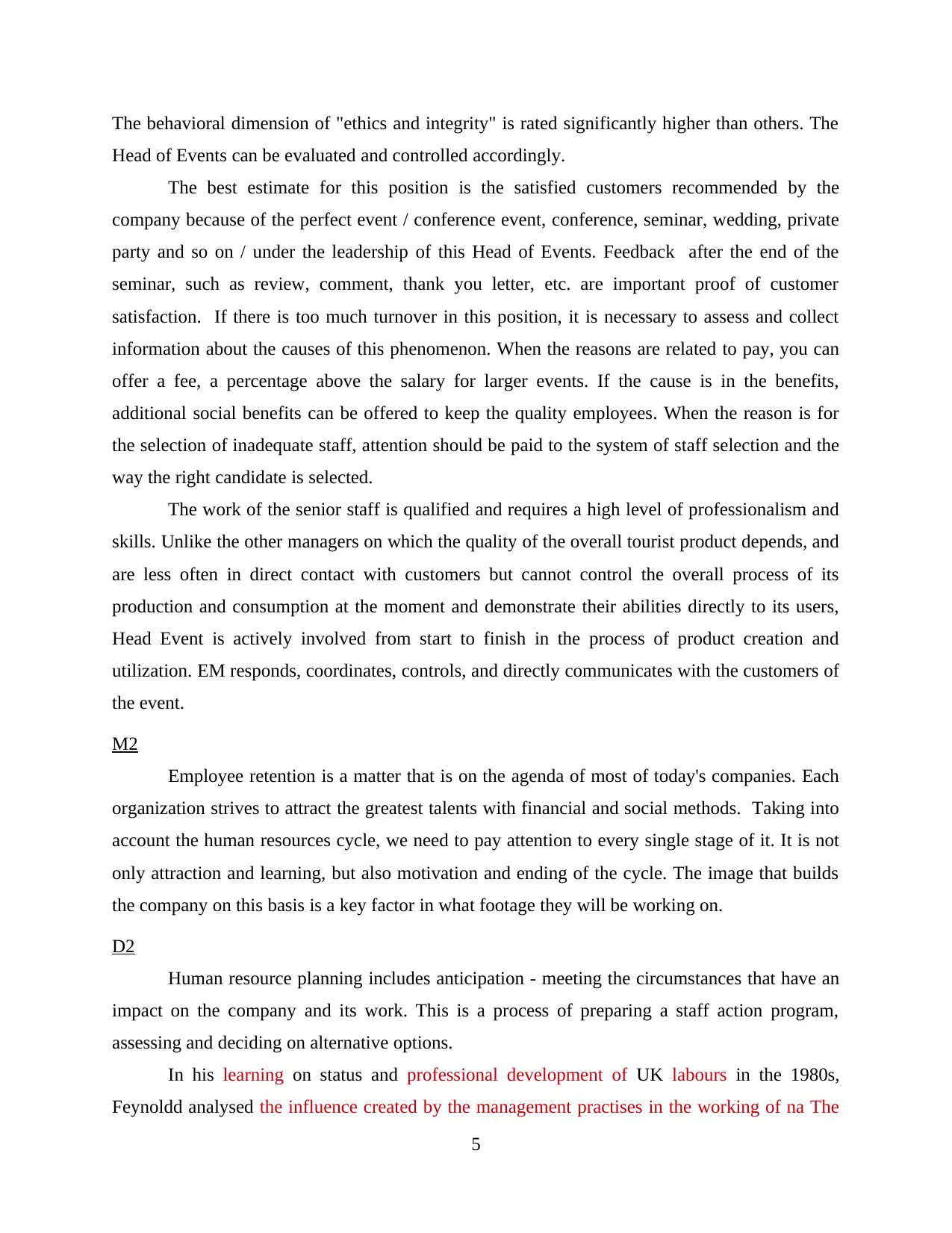
The behavioral dimension of "ethics and integrity" is rated significantly higher than others. The
Head of Events can be evaluated and controlled accordingly.
The best estimate for this position is the satisfied customers recommended by the
company because of the perfect event / conference event, conference, seminar, wedding, private
party and so on / under the leadership of this Head of Events. Feedback after the end of the
seminar, such as review, comment, thank you letter, etc. are important proof of customer
satisfaction. If there is too much turnover in this position, it is necessary to assess and collect
information about the causes of this phenomenon. When the reasons are related to pay, you can
offer a fee, a percentage above the salary for larger events. If the cause is in the benefits,
additional social benefits can be offered to keep the quality employees. When the reason is for
the selection of inadequate staff, attention should be paid to the system of staff selection and the
way the right candidate is selected.
The work of the senior staff is qualified and requires a high level of professionalism and
skills. Unlike the other managers on which the quality of the overall tourist product depends, and
are less often in direct contact with customers but cannot control the overall process of its
production and consumption at the moment and demonstrate their abilities directly to its users,
Head Event is actively involved from start to finish in the process of product creation and
utilization. EM responds, coordinates, controls, and directly communicates with the customers of
the event.
M2
Employee retention is a matter that is on the agenda of most of today's companies. Each
organization strives to attract the greatest talents with financial and social methods. Taking into
account the human resources cycle, we need to pay attention to every single stage of it. It is not
only attraction and learning, but also motivation and ending of the cycle. The image that builds
the company on this basis is a key factor in what footage they will be working on.
D2
Human resource planning includes anticipation - meeting the circumstances that have an
impact on the company and its work. This is a process of preparing a staff action program,
assessing and deciding on alternative options.
In his learning on status and professional development of UK labours in the 1980s,
Feynoldd analysed the influence created by the management practises in the working of na The
5
Head of Events can be evaluated and controlled accordingly.
The best estimate for this position is the satisfied customers recommended by the
company because of the perfect event / conference event, conference, seminar, wedding, private
party and so on / under the leadership of this Head of Events. Feedback after the end of the
seminar, such as review, comment, thank you letter, etc. are important proof of customer
satisfaction. If there is too much turnover in this position, it is necessary to assess and collect
information about the causes of this phenomenon. When the reasons are related to pay, you can
offer a fee, a percentage above the salary for larger events. If the cause is in the benefits,
additional social benefits can be offered to keep the quality employees. When the reason is for
the selection of inadequate staff, attention should be paid to the system of staff selection and the
way the right candidate is selected.
The work of the senior staff is qualified and requires a high level of professionalism and
skills. Unlike the other managers on which the quality of the overall tourist product depends, and
are less often in direct contact with customers but cannot control the overall process of its
production and consumption at the moment and demonstrate their abilities directly to its users,
Head Event is actively involved from start to finish in the process of product creation and
utilization. EM responds, coordinates, controls, and directly communicates with the customers of
the event.
M2
Employee retention is a matter that is on the agenda of most of today's companies. Each
organization strives to attract the greatest talents with financial and social methods. Taking into
account the human resources cycle, we need to pay attention to every single stage of it. It is not
only attraction and learning, but also motivation and ending of the cycle. The image that builds
the company on this basis is a key factor in what footage they will be working on.
D2
Human resource planning includes anticipation - meeting the circumstances that have an
impact on the company and its work. This is a process of preparing a staff action program,
assessing and deciding on alternative options.
In his learning on status and professional development of UK labours in the 1980s,
Feynoldd analysed the influence created by the management practises in the working of na The
5
Paraphrase This Document
Need a fresh take? Get an instant paraphrase of this document with our AI Paraphraser
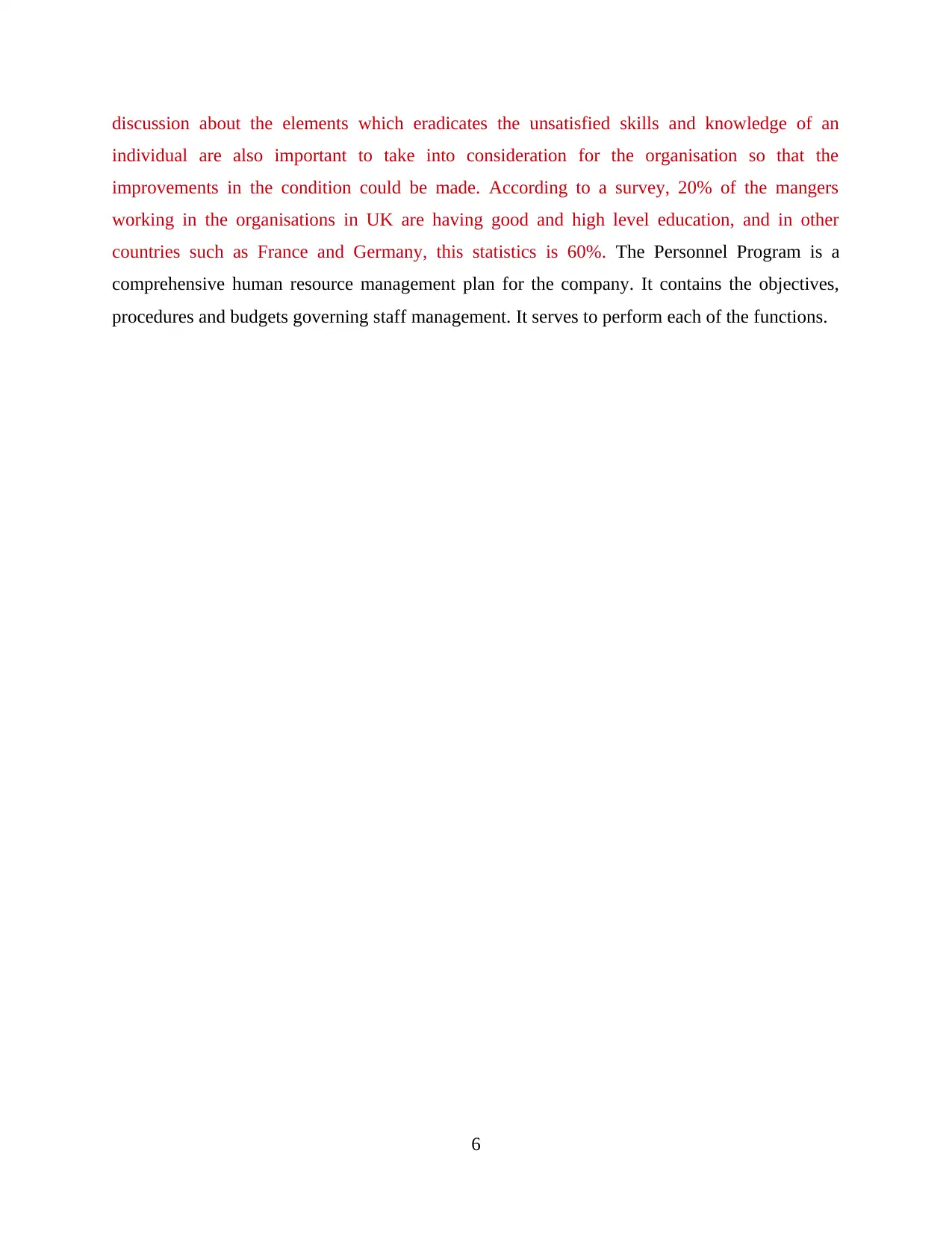
discussion about the elements which eradicates the unsatisfied skills and knowledge of an
individual are also important to take into consideration for the organisation so that the
improvements in the condition could be made. According to a survey, 20% of the mangers
working in the organisations in UK are having good and high level education, and in other
countries such as France and Germany, this statistics is 60%. The Personnel Program is a
comprehensive human resource management plan for the company. It contains the objectives,
procedures and budgets governing staff management. It serves to perform each of the functions.
6
individual are also important to take into consideration for the organisation so that the
improvements in the condition could be made. According to a survey, 20% of the mangers
working in the organisations in UK are having good and high level education, and in other
countries such as France and Germany, this statistics is 60%. The Personnel Program is a
comprehensive human resource management plan for the company. It contains the objectives,
procedures and budgets governing staff management. It serves to perform each of the functions.
6
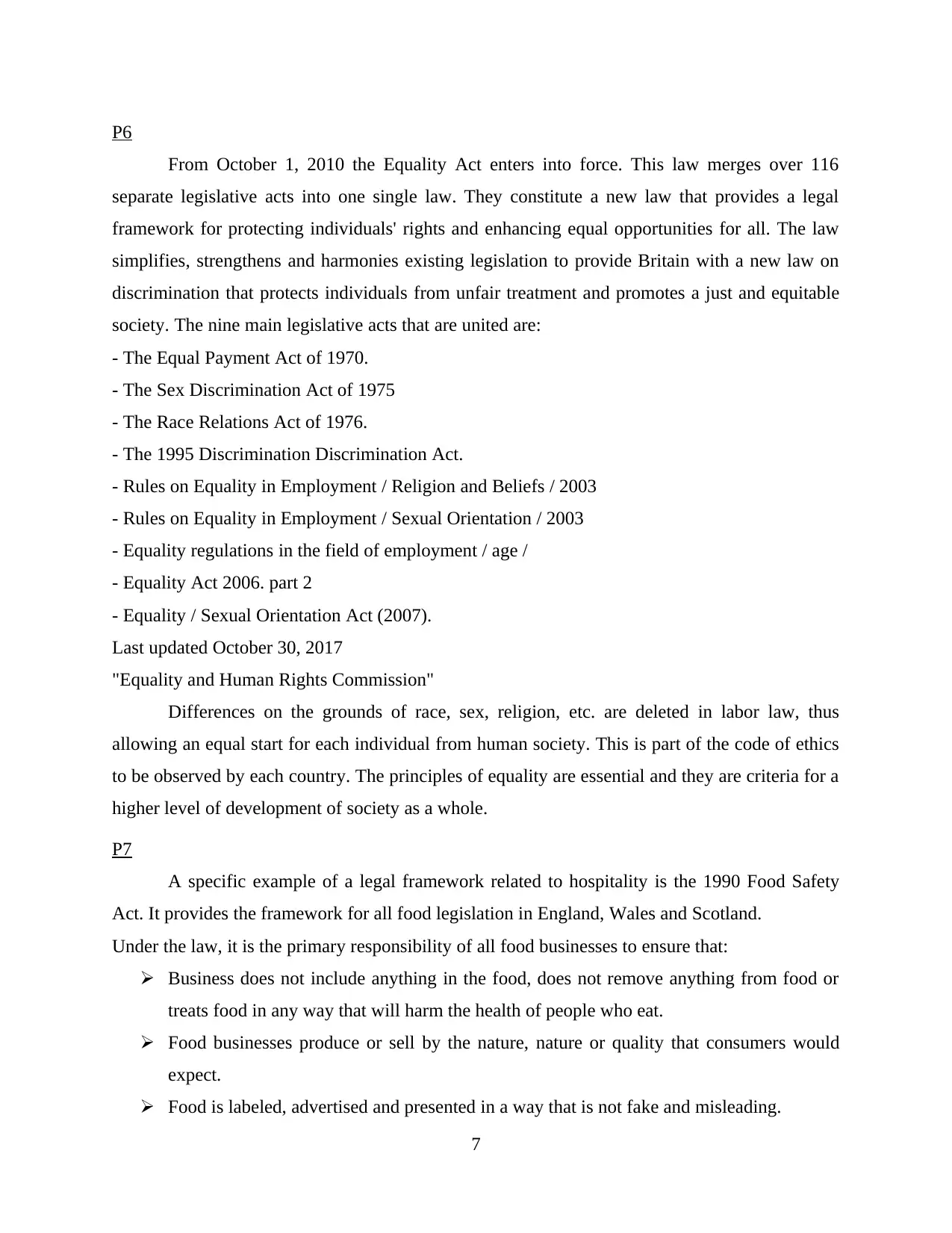
P6
From October 1, 2010 the Equality Act enters into force. This law merges over 116
separate legislative acts into one single law. They constitute a new law that provides a legal
framework for protecting individuals' rights and enhancing equal opportunities for all. The law
simplifies, strengthens and harmonies existing legislation to provide Britain with a new law on
discrimination that protects individuals from unfair treatment and promotes a just and equitable
society. The nine main legislative acts that are united are:
- The Equal Payment Act of 1970.
- The Sex Discrimination Act of 1975
- The Race Relations Act of 1976.
- The 1995 Discrimination Discrimination Act.
- Rules on Equality in Employment / Religion and Beliefs / 2003
- Rules on Equality in Employment / Sexual Orientation / 2003
- Equality regulations in the field of employment / age /
- Equality Act 2006. part 2
- Equality / Sexual Orientation Act (2007).
Last updated October 30, 2017
"Equality and Human Rights Commission"
Differences on the grounds of race, sex, religion, etc. are deleted in labor law, thus
allowing an equal start for each individual from human society. This is part of the code of ethics
to be observed by each country. The principles of equality are essential and they are criteria for a
higher level of development of society as a whole.
P7
A specific example of a legal framework related to hospitality is the 1990 Food Safety
Act. It provides the framework for all food legislation in England, Wales and Scotland.
Under the law, it is the primary responsibility of all food businesses to ensure that:
Business does not include anything in the food, does not remove anything from food or
treats food in any way that will harm the health of people who eat.
Food businesses produce or sell by the nature, nature or quality that consumers would
expect.
Food is labeled, advertised and presented in a way that is not fake and misleading.
7
From October 1, 2010 the Equality Act enters into force. This law merges over 116
separate legislative acts into one single law. They constitute a new law that provides a legal
framework for protecting individuals' rights and enhancing equal opportunities for all. The law
simplifies, strengthens and harmonies existing legislation to provide Britain with a new law on
discrimination that protects individuals from unfair treatment and promotes a just and equitable
society. The nine main legislative acts that are united are:
- The Equal Payment Act of 1970.
- The Sex Discrimination Act of 1975
- The Race Relations Act of 1976.
- The 1995 Discrimination Discrimination Act.
- Rules on Equality in Employment / Religion and Beliefs / 2003
- Rules on Equality in Employment / Sexual Orientation / 2003
- Equality regulations in the field of employment / age /
- Equality Act 2006. part 2
- Equality / Sexual Orientation Act (2007).
Last updated October 30, 2017
"Equality and Human Rights Commission"
Differences on the grounds of race, sex, religion, etc. are deleted in labor law, thus
allowing an equal start for each individual from human society. This is part of the code of ethics
to be observed by each country. The principles of equality are essential and they are criteria for a
higher level of development of society as a whole.
P7
A specific example of a legal framework related to hospitality is the 1990 Food Safety
Act. It provides the framework for all food legislation in England, Wales and Scotland.
Under the law, it is the primary responsibility of all food businesses to ensure that:
Business does not include anything in the food, does not remove anything from food or
treats food in any way that will harm the health of people who eat.
Food businesses produce or sell by the nature, nature or quality that consumers would
expect.
Food is labeled, advertised and presented in a way that is not fake and misleading.
7
⊘ This is a preview!⊘
Do you want full access?
Subscribe today to unlock all pages.

Trusted by 1+ million students worldwide
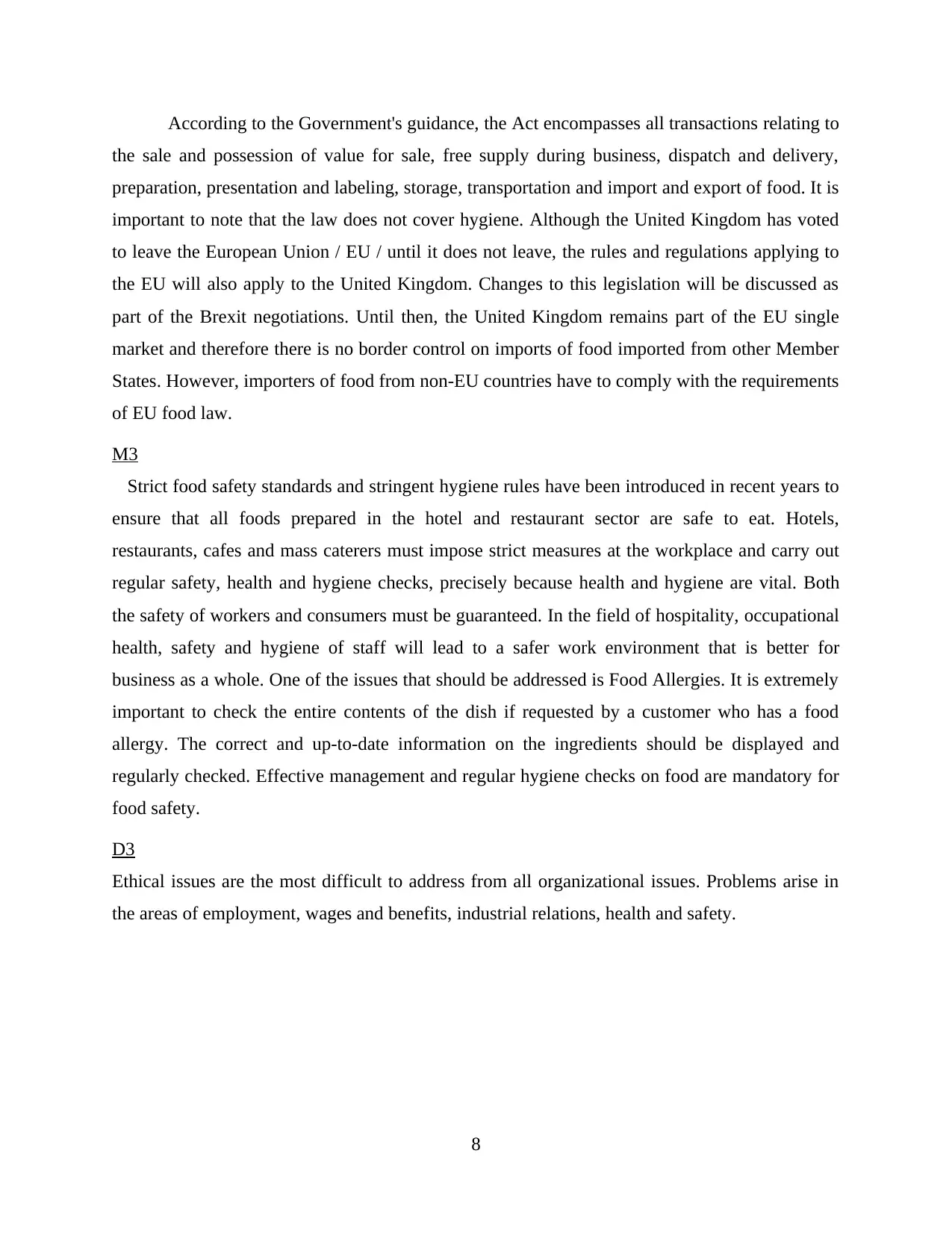
According to the Government's guidance, the Act encompasses all transactions relating to
the sale and possession of value for sale, free supply during business, dispatch and delivery,
preparation, presentation and labeling, storage, transportation and import and export of food. It is
important to note that the law does not cover hygiene. Although the United Kingdom has voted
to leave the European Union / EU / until it does not leave, the rules and regulations applying to
the EU will also apply to the United Kingdom. Changes to this legislation will be discussed as
part of the Brexit negotiations. Until then, the United Kingdom remains part of the EU single
market and therefore there is no border control on imports of food imported from other Member
States. However, importers of food from non-EU countries have to comply with the requirements
of EU food law.
M3
Strict food safety standards and stringent hygiene rules have been introduced in recent years to
ensure that all foods prepared in the hotel and restaurant sector are safe to eat. Hotels,
restaurants, cafes and mass caterers must impose strict measures at the workplace and carry out
regular safety, health and hygiene checks, precisely because health and hygiene are vital. Both
the safety of workers and consumers must be guaranteed. In the field of hospitality, occupational
health, safety and hygiene of staff will lead to a safer work environment that is better for
business as a whole. One of the issues that should be addressed is Food Allergies. It is extremely
important to check the entire contents of the dish if requested by a customer who has a food
allergy. The correct and up-to-date information on the ingredients should be displayed and
regularly checked. Effective management and regular hygiene checks on food are mandatory for
food safety.
D3
Ethical issues are the most difficult to address from all organizational issues. Problems arise in
the areas of employment, wages and benefits, industrial relations, health and safety.
8
the sale and possession of value for sale, free supply during business, dispatch and delivery,
preparation, presentation and labeling, storage, transportation and import and export of food. It is
important to note that the law does not cover hygiene. Although the United Kingdom has voted
to leave the European Union / EU / until it does not leave, the rules and regulations applying to
the EU will also apply to the United Kingdom. Changes to this legislation will be discussed as
part of the Brexit negotiations. Until then, the United Kingdom remains part of the EU single
market and therefore there is no border control on imports of food imported from other Member
States. However, importers of food from non-EU countries have to comply with the requirements
of EU food law.
M3
Strict food safety standards and stringent hygiene rules have been introduced in recent years to
ensure that all foods prepared in the hotel and restaurant sector are safe to eat. Hotels,
restaurants, cafes and mass caterers must impose strict measures at the workplace and carry out
regular safety, health and hygiene checks, precisely because health and hygiene are vital. Both
the safety of workers and consumers must be guaranteed. In the field of hospitality, occupational
health, safety and hygiene of staff will lead to a safer work environment that is better for
business as a whole. One of the issues that should be addressed is Food Allergies. It is extremely
important to check the entire contents of the dish if requested by a customer who has a food
allergy. The correct and up-to-date information on the ingredients should be displayed and
regularly checked. Effective management and regular hygiene checks on food are mandatory for
food safety.
D3
Ethical issues are the most difficult to address from all organizational issues. Problems arise in
the areas of employment, wages and benefits, industrial relations, health and safety.
8
Paraphrase This Document
Need a fresh take? Get an instant paraphrase of this document with our AI Paraphraser
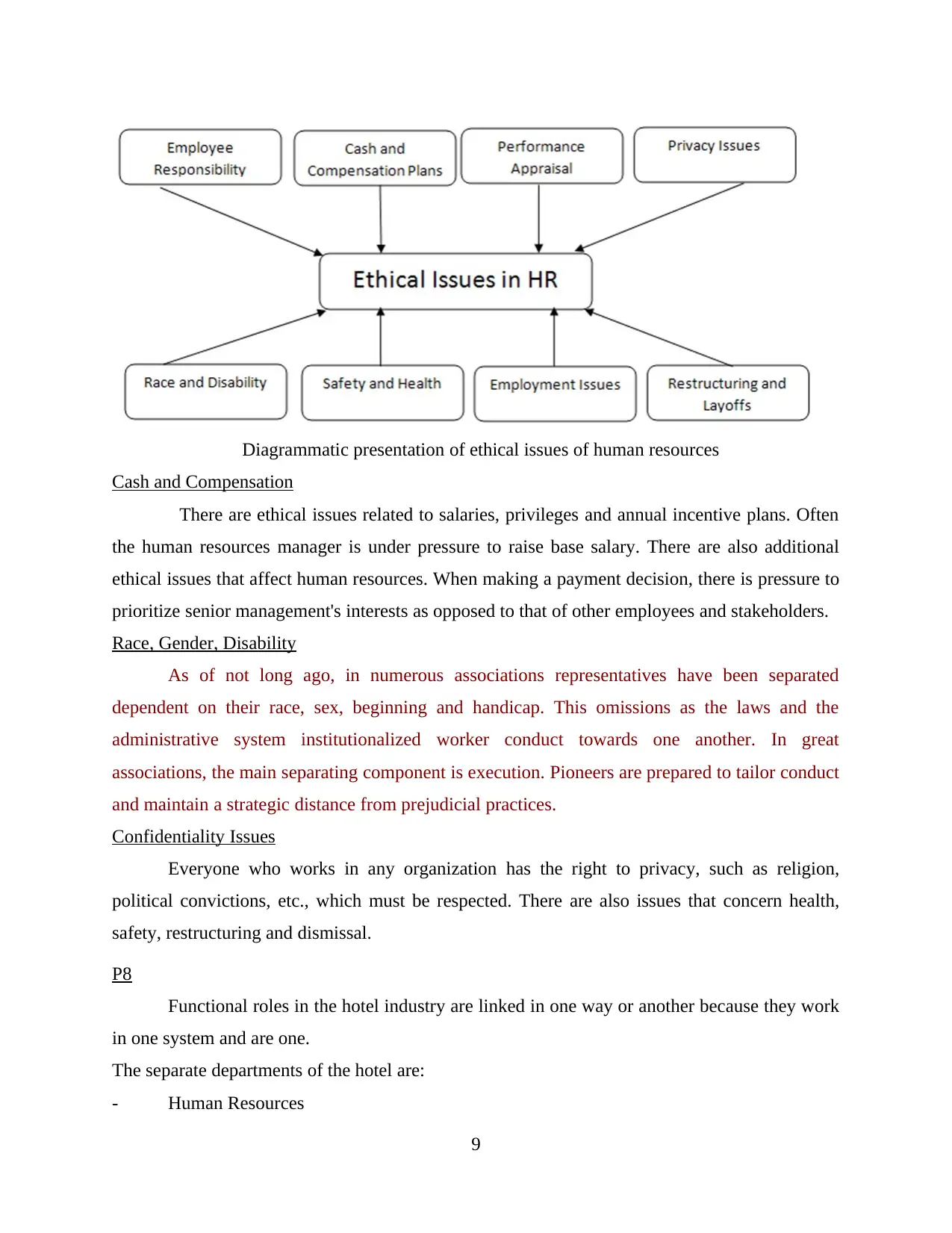
Diagrammatic presentation of ethical issues of human resources
Cash and Compensation
There are ethical issues related to salaries, privileges and annual incentive plans. Often
the human resources manager is under pressure to raise base salary. There are also additional
ethical issues that affect human resources. When making a payment decision, there is pressure to
prioritize senior management's interests as opposed to that of other employees and stakeholders.
Race, Gender, Disability
As of not long ago, in numerous associations representatives have been separated
dependent on their race, sex, beginning and handicap. This omissions as the laws and the
administrative system institutionalized worker conduct towards one another. In great
associations, the main separating component is execution. Pioneers are prepared to tailor conduct
and maintain a strategic distance from prejudicial practices.
Confidentiality Issues
Everyone who works in any organization has the right to privacy, such as religion,
political convictions, etc., which must be respected. There are also issues that concern health,
safety, restructuring and dismissal.
P8
Functional roles in the hotel industry are linked in one way or another because they work
in one system and are one.
The separate departments of the hotel are:
- Human Resources
9
Cash and Compensation
There are ethical issues related to salaries, privileges and annual incentive plans. Often
the human resources manager is under pressure to raise base salary. There are also additional
ethical issues that affect human resources. When making a payment decision, there is pressure to
prioritize senior management's interests as opposed to that of other employees and stakeholders.
Race, Gender, Disability
As of not long ago, in numerous associations representatives have been separated
dependent on their race, sex, beginning and handicap. This omissions as the laws and the
administrative system institutionalized worker conduct towards one another. In great
associations, the main separating component is execution. Pioneers are prepared to tailor conduct
and maintain a strategic distance from prejudicial practices.
Confidentiality Issues
Everyone who works in any organization has the right to privacy, such as religion,
political convictions, etc., which must be respected. There are also issues that concern health,
safety, restructuring and dismissal.
P8
Functional roles in the hotel industry are linked in one way or another because they work
in one system and are one.
The separate departments of the hotel are:
- Human Resources
9
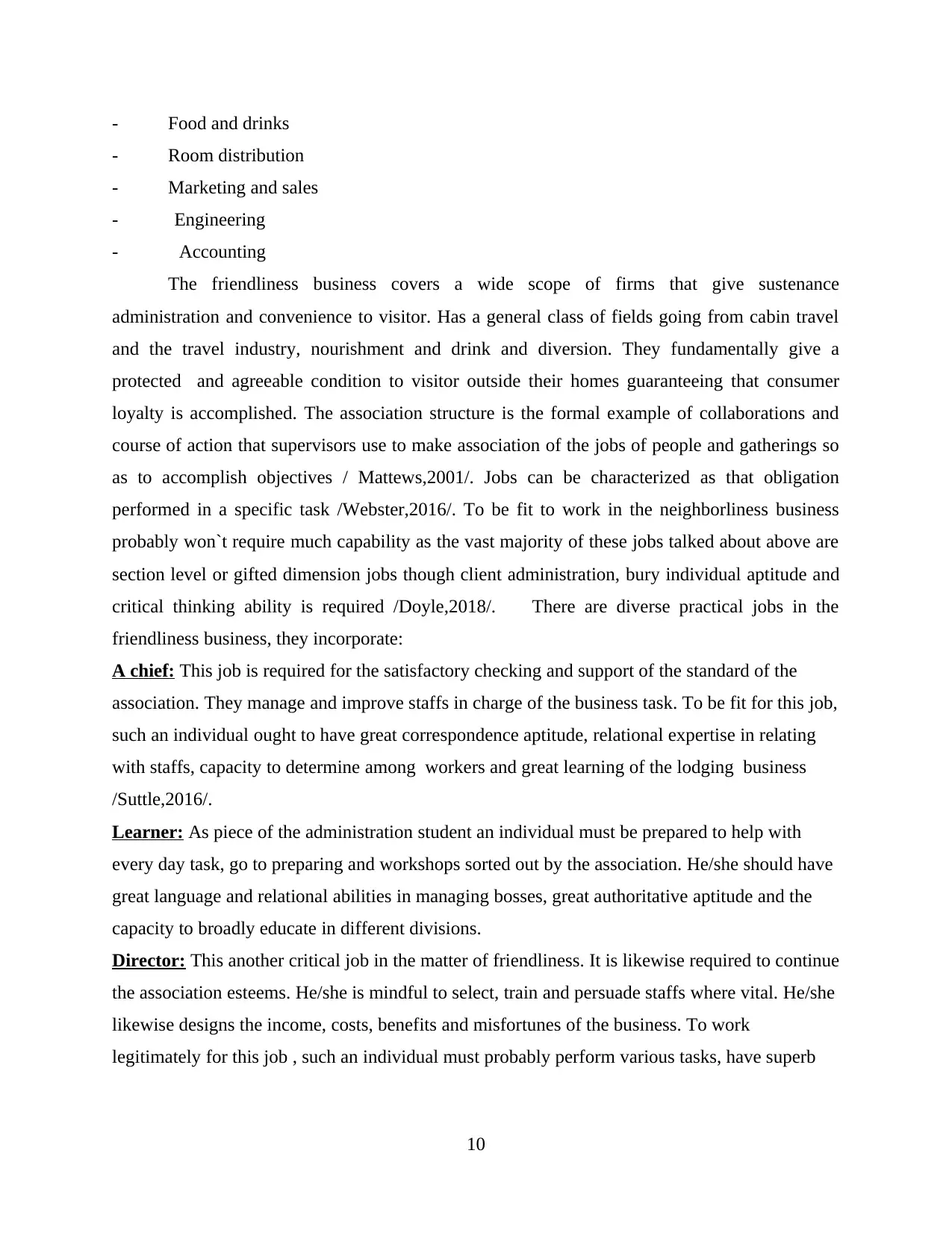
- Food and drinks
- Room distribution
- Marketing and sales
- Engineering
- Accounting
The friendliness business covers a wide scope of firms that give sustenance
administration and convenience to visitor. Has a general class of fields going from cabin travel
and the travel industry, nourishment and drink and diversion. They fundamentally give a
protected and agreeable condition to visitor outside their homes guaranteeing that consumer
loyalty is accomplished. The association structure is the formal example of collaborations and
course of action that supervisors use to make association of the jobs of people and gatherings so
as to accomplish objectives / Mattews,2001/. Jobs can be characterized as that obligation
performed in a specific task /Webster,2016/. To be fit to work in the neighborliness business
probably won`t require much capability as the vast majority of these jobs talked about above are
section level or gifted dimension jobs though client administration, bury individual aptitude and
critical thinking ability is required /Doyle,2018/. There are diverse practical jobs in the
friendliness business, they incorporate:
A chief: This job is required for the satisfactory checking and support of the standard of the
association. They manage and improve staffs in charge of the business task. To be fit for this job,
such an individual ought to have great correspondence aptitude, relational expertise in relating
with staffs, capacity to determine among workers and great learning of the lodging business
/Suttle,2016/.
Learner: As piece of the administration student an individual must be prepared to help with
every day task, go to preparing and workshops sorted out by the association. He/she should have
great language and relational abilities in managing bosses, great authoritative aptitude and the
capacity to broadly educate in different divisions.
Director: This another critical job in the matter of friendliness. It is likewise required to continue
the association esteems. He/she is mindful to select, train and persuade staffs where vital. He/she
likewise designs the income, costs, benefits and misfortunes of the business. To work
legitimately for this job , such an individual must probably perform various tasks, have superb
10
- Room distribution
- Marketing and sales
- Engineering
- Accounting
The friendliness business covers a wide scope of firms that give sustenance
administration and convenience to visitor. Has a general class of fields going from cabin travel
and the travel industry, nourishment and drink and diversion. They fundamentally give a
protected and agreeable condition to visitor outside their homes guaranteeing that consumer
loyalty is accomplished. The association structure is the formal example of collaborations and
course of action that supervisors use to make association of the jobs of people and gatherings so
as to accomplish objectives / Mattews,2001/. Jobs can be characterized as that obligation
performed in a specific task /Webster,2016/. To be fit to work in the neighborliness business
probably won`t require much capability as the vast majority of these jobs talked about above are
section level or gifted dimension jobs though client administration, bury individual aptitude and
critical thinking ability is required /Doyle,2018/. There are diverse practical jobs in the
friendliness business, they incorporate:
A chief: This job is required for the satisfactory checking and support of the standard of the
association. They manage and improve staffs in charge of the business task. To be fit for this job,
such an individual ought to have great correspondence aptitude, relational expertise in relating
with staffs, capacity to determine among workers and great learning of the lodging business
/Suttle,2016/.
Learner: As piece of the administration student an individual must be prepared to help with
every day task, go to preparing and workshops sorted out by the association. He/she should have
great language and relational abilities in managing bosses, great authoritative aptitude and the
capacity to broadly educate in different divisions.
Director: This another critical job in the matter of friendliness. It is likewise required to continue
the association esteems. He/she is mindful to select, train and persuade staffs where vital. He/she
likewise designs the income, costs, benefits and misfortunes of the business. To work
legitimately for this job , such an individual must probably perform various tasks, have superb
10
⊘ This is a preview!⊘
Do you want full access?
Subscribe today to unlock all pages.

Trusted by 1+ million students worldwide
1 out of 16
Related Documents
Your All-in-One AI-Powered Toolkit for Academic Success.
+13062052269
info@desklib.com
Available 24*7 on WhatsApp / Email
![[object Object]](/_next/static/media/star-bottom.7253800d.svg)
Unlock your academic potential
Copyright © 2020–2025 A2Z Services. All Rights Reserved. Developed and managed by ZUCOL.





